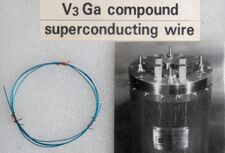Vanadium–gallium
Topic: Physics
 From HandWiki - Reading time: 2 min
From HandWiki - Reading time: 2 min
Vanadium–gallium (V3Ga) is a superconducting alloy of vanadium and gallium. It is often used for the high field insert coils of superconducting electromagnets.[clarification needed][citation needed]
Vanadium–gallium tape is used in the highest field magnets (magnetic fields of 17.5 T). The structure of the superconducting A15 phase of V
3Ga is similar to that of the more common Nb
3Sn.[1]
In conditions where the magnetic field is higher than 8 T and the temperature is higher than 4.2 K, Nb
3Sn and V
3Ga see use.
The main property of V
3Ga that makes it so useful is that it can be used in magnetic fields up to about 18 T, while Nb
3Sn can only be used in fields up to about 15 T.[2]
The high field characteristics can be improved by doping with high-Z elements such as Nb, Ta, Sn, Pt and Pb.[3]
Physical Properties
| Molecular Weight | 222.55 g/mol |
| Melting Point | 1720 °C |
| Highest magnetic field | 18 T |
V
3Ga has an A15 phase, which makes it extremely brittle. One must be extremely cautious not to over-bend the wire when handling it. [2]
Superconducting properties
- Critical temperature (Tc): ~14.2 K[5]
- Upper critical field (Hc2): over 19 T.
Fabrication of superconductive wires or tapes
V
3Ga wires can be formed using solid-state precipitation.[6]
History
References
- ↑ Markiewicz, W.; Mains, E.; Vankeuren, R.; Wilcox, R.; Rosner, C.; Inoue, H.; Hayashi, C.; Tachikawa, K. (1977). "A 17.5 Tesla superconducting concentric Nb3Sn and V3Ga magnet system". IEEE Transactions on Magnetics 13 (1): 35–37. doi:10.1109/TMAG.1977.1059431. Bibcode: 1977ITM....13...35M.
- ↑ 2.0 2.1 Ekin, Jack W. (1983). "Superconductors". in Reed, Richard P.; Clark, Alan F.. Materials at Low Temperatures. Russell, OH: American Society for Metals. pp. 465–513. ISBN 978-1-62708-348-5.
- ↑ Tedrow, P. M.; Meservy, R. (1984), "Improvement in magnetic field properties of vanadium–gallium superconductors by enhancement of spin-orbit scattering", MIT Report, Bibcode: 1984mit..reptR....T
- ↑ "Vanadium Gallide". https://www.americanelements.com/vanadium-gallide-12024-15-6.
- ↑ Decker, D. L. Laquer, H. L. (1969), "Magnetization Studies on Superconducting Vanadium‐Gallium", Journal of Applied Physics 40 (7): 2817–2822, doi:10.1063/1.1658081, Bibcode: 1969JAP....40.2817D, https://ieeexplore.ieee.org/document/5095068
- ↑ Hong, Minghwei (1980), A15 superconductors through direct "solid-state" precipitation: V3Ga AND Nb3Al, http://www.escholarship.org/uc/item/995579gc
 |
13 views | Status: cached on September 12 2024 06:49:55
↧ Download this article as ZWI file
 KSF
KSF

